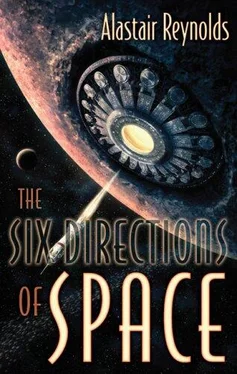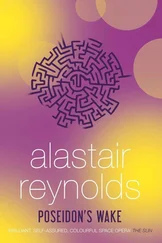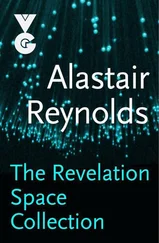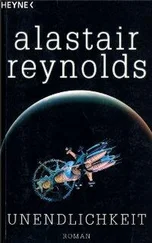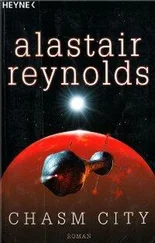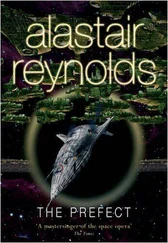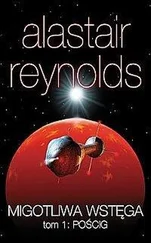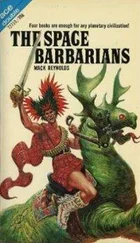“This isn’t to hurt you,” Qilian said magnanimously. “It’s to help you.”
The couch was a skeletal white contraption, encumbered with pads and restraints and delicate hinged accessories that would fold over the occupant once they had been secured in place.
“I do not understand,” Muhunnad said, although I think he did.
“We have studied your implants and deduced something of their function,” Qilian said. “Not enough to learn everything about them, but enough to let you control one of our ships, instead of the one you were meant to fly.”
“It will not work.”
“No one is pretending it will be easy. But it is in your interests to do what you can to make it succeed.
Help us navigate the Infrastructure—the way you do, finding the weak points and slipping through them—and we will let you return home.”
“I do not believe you.”
“You have no option but to believe me. If you cannot assist me in this matter, you will have concluded your usefulness to me. Given the trouble I would get into if New High Karakorum learned of your existence, I would have no option but to dispose of you.”
“He means it,” I said forcefully. “Help us fly the ships, Muhunnad. Whatever happens, it’s better than staying here.”
He looked at me as if I was the one thing in the universe he was willing to trust. Given all that had happened to him since leaving his people, it did not surprise me in the slightest.
“Plug him in,” Qilian told the technicians. “And don’t be too tender about it.”
* * *
The name of the ship was the River Volga. She was half a li in length, her frontal stabilization spines suggesting the curving whiskers of a catfish. She had been a merchant vehicle once; later, she had been equipped for scouring the Parvan Tract for phantom relics, and, most recently, she had been hardened and weaponed for an exploratory role. She would carry six of us: Muhunnad, Qilian, Uugan, and two more members of the technical staff—their names were Jura and Batbayar—and myself. Next to her, identical in almost all respects, was the
Mandate of Heaven.
The only significant distinction between the two craft was that Muhunnad would be piloting the
River Volga,
while the
Mandate of Heaven
followed close behind, slaved to follow the same trajectory to within a fraction of an
aid.
The navigation and steering mechanisms of both ships had been upgraded to permit high-agility maneuvers, including reversals, close-proximity wall skimming, and suboptimal portal transits. It did not bear thinking about the cost of equipping those two ships, or where the funds had been siphoned from, but I supposed the citizens of the Kuchlug special administrative volume would be putting up with hardships for a little while longer.
We spent five days in shakedown tests before entering the Tract, scooting around the system, dodging planets and moons in high-gee swerves. During that time, Muhunnad’s integration into the harness was slowly improved, more and more ship systems brought under his direct control, until he reported the utmost confidence in being able to handle the River Volga during Infrastructure flight.
“Are you sure?” I asked.
“Truly, Ariunaa. This ship feels as much a part of me as anything I ever flew in the Shining Caliphate.”
“But indescribably less sophisticated.”
“I would not wish to hurt your feelings. Given your resources, you have not done too badly.”
The transit, when it came, was utterly uneventful. The Mandate of Heaven reported some minor buffeting, but this was soon negated following a refinement of the control linkage between the two ships.
Then we had nothing to do but wait until Muhunnad detected one of the points of weakening where, with a judicious alteration in our trajectory, we might slip from one version of the Infrastructure to another.
Did I seriously think that Qilian would keep his promise of returning Muhunnad to his own people? Not really, unless my master had hopes of forging some kind of alliance with the Shining Caliphate, to use as leverage against the central authority of New High Karakorum. If that was his intention, I did not think he had much hope of succeeding. The Caliphate would have every reason to despise us, and yet-given the demonstrably higher level of both their technology and their intelligence—there was nothing they could possibly want from us except craven submission and cowering remorse for the holocaust we had visited upon their culture nearly a thousand years earlier.
No; I did not think Muhunnad stood much chance of returning home. Perhaps he knew that as well. But it was better to pretend to believe in Qilian’s promises than incur his bored wrath back on the Qing Shui moon. At least this way, Muhunnad could continue to be materially useful to Qilian and, therefore, too valuable to hurt.
The detection of a weakening in the tunnel geometry, Muhunnad explained, was only just possible given the blunt sensibilities of our instruments. The Caliphate kept detailed maps of such things, but no record had survived his capture by the lemurs, and the information was too voluminous to be committed to memory. He recalled that there were four weak points in the section of Infrastructure we called the Parvan Tract, but not their precise locations or detailed properties.
No matter; he had every incentive to succeed. We overshot the first weakening, but the incident gave Muhunnad a chance to refine the manner in which he sifted the sensor data, and he was confident that he would not make the same error twice. Rather than attempt a reversal, it was agreed to push forward until we encountered the next weakening. It happened two days later, halfway to the Gansu nexus. This time, Muhunnad started to detect the subtle changes in the properties of the tunnel in time to initiate a hard slow-down, echoed by the Mandate of Heaven immediately to our stern.
We had been warned that the passage would be rough; this was an understatement. Fortunately, we were all braced and ready when it came; we had had two minutes’ warning before the moment arrived.
Even then, the ship gave every indication of coming close to breakup; she whinnied like a horse, her structural members singing as if they had been plucked. Several steering vanes broke loose during the swerve, but the River Volga had been equipped to withstand losses that would have crippled a normal ship; all that happened was that hull plates swung open and new vanes pushed out to replace the missing ones. Behind us, the Mandate of Heaven suffered slightly less damage; Muhunnad had been able to send correctional steering signals to her guidance system, allowing her to follow a less treacherous path.
And then we were back in the tunnel, traveling normally. To all intents and purposes, it was as if nothing had happened. We appeared to be still inside the Parvan Tract.
“We have become phantoms now,” Muhunnad informed us. “This is someone else’s Infrastructure.”
Qilian leaned over the control couch, where our pilot lay in a state of partial paralysis, wired so deeply into the River Volga’s nervous system that his own body was but an incidental detail. Around us, the bridge instruments recorded normal conditions of Infrastructure transit.
“Where are we?”
“There’s no way of telling, not with these sensors. Not until we emerge.”
“In the Gansu nexus?”
“Yes,” he replied. “Or whatever they call it. There will be risks; you will not have seen many phantoms emerge into your version of the nexus because most such ships will make every effort to slip through another weakening.”
Читать дальше
